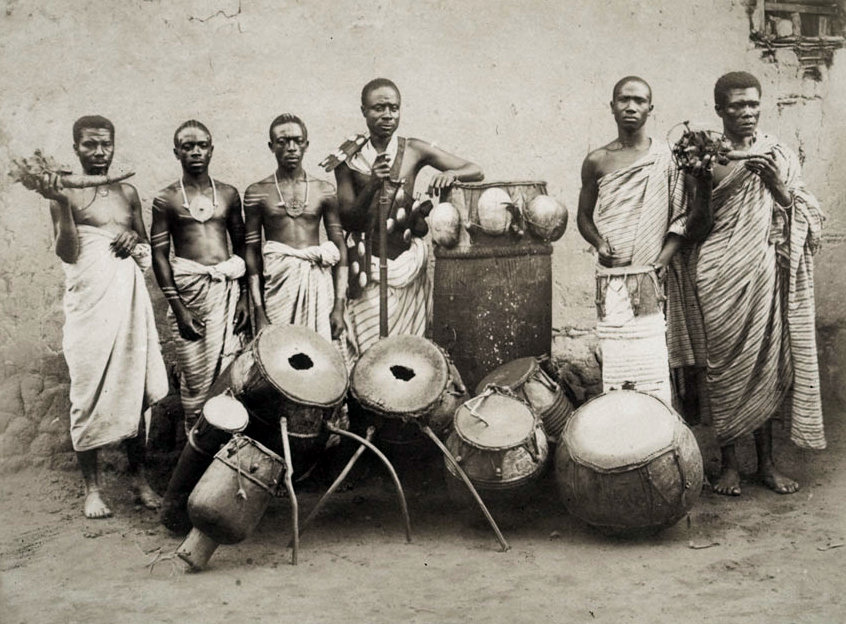
African Religious and Ritualistic Practices and Music
Africans manifested their religious beliefs through ritual, often expressed musically. They worshiped God and venerated their ancestors and familiar spirits, calling on the divinities to assist them in making such contacts. One such practice was the ring shoutA religious ritual with roots in Central and West Africa in which worshipers move in a circle to a syncopated rhythm while shuffling and stomping their feet and clapping their hands.. The ring was familiar to many African societies as a symbol of community, solidarity, affirmation, and catharsis. It consisted of participants gathered in a circle with the drums in the center. The ring would move in a circular, counterclockwise direction, with people's feet slightly leaving the ground. Participants would then employ various calls, cries, and hollers; call-and-response devices; heterophony; pendular thirds; blue notes, bent notes, and elisions; hums, moans, grunts, vocables, and other rhythmic-oral declamations, exclamations, and punctuation or wordless intensifiers; offbeat melodic figures and phrases; timbral distortions of various kinds (for instance, by manipulating the stretching and contacting the drumhead); and handclapping or knee-slapping.
The dance was held together by a timeline that often consisted of a basic pulse that could be additive, divisive, or a density referent to the pulse. It is against the timeline that the other instruments play the multi-linear rhythms that yield the exciting interlocking, cross-rhythmic, and polyrhythmic configurations of African music. Refer to the video "Traditional Music of Benin (West African Music)".

Traditional Music of Benin (West African Music)
From deep within the African people's souls, there emerged a "response"-one that is immensely cathartic, spontaneous, and yet, communal. Within the context of rhythm, dance, and song, a spiritual manifestation occurs in the natural realm-a supernatural power that transforms the body, mind, and soul. Amadou Hampaté Bâ, a scholar in the Fulani and Bamana religions of West Africa, offers a salient point by stating: "No one who considers
Traditional Africa from a strictly secular point of view can hope to understand it." He goes on to say: "If you want to understand Africa, it is necessary to account for religion-I am not saying Islamic, Christian, or Jewish religion-I am saying religion that is faith (Brodnicka 2021, 311-45)." The faith that Bâ refers to encompasses the intersection of the spiritual and material worlds. It is the role of spiritual communication that binds the relationship of the human being to the Divine. In every sense of this belief, the inseparable entities of rhythm, song, and dance yield and affirm the "spiritually human."
It is imperative to understand that preserving African cultural heritage was essential in maintaining one's core identity while affirming solidarity and strength within the community. This world vision implies an understanding of the sacred world and spiritual forces therein and the innate ability to reconcile one's cultural heritage with present realities fully. We will find this to be most evident in the birth of African American music and its sociocultural expression. Among the regions of Africa discussed in this section lies a diversity of languages. In West Africa alone, people speak thousands of languages. The only universal tool of communication was that found in the rhythm of the drum. As Arthur C. Jones explains, the immediate problem for Africans coming together to break from bondage was language (1993, 16).
Indeed, this phenomenon explains why many slave traders deliberately mixed imported slaves. Not only were various tribes separated from those from their region, families, and kindred, but they were linguistically lost amid this myriad of malice. In the video "Life Aboard a Slave Ship: History" gruesomely shows the shipment of Africans to America via the Middle Passage:

Life Aboard a Slave Ship | History [ 00:00-00:00 ]
Ayantoyese Onifade
A society without drum is engrossed in bitterness.
Amadou Hampaté Bâ
If you want to understand Africa, it is necessary to account for religion-I am not saying Islamic, Christian, or Jewish religion-I am saying religion that is faith.







